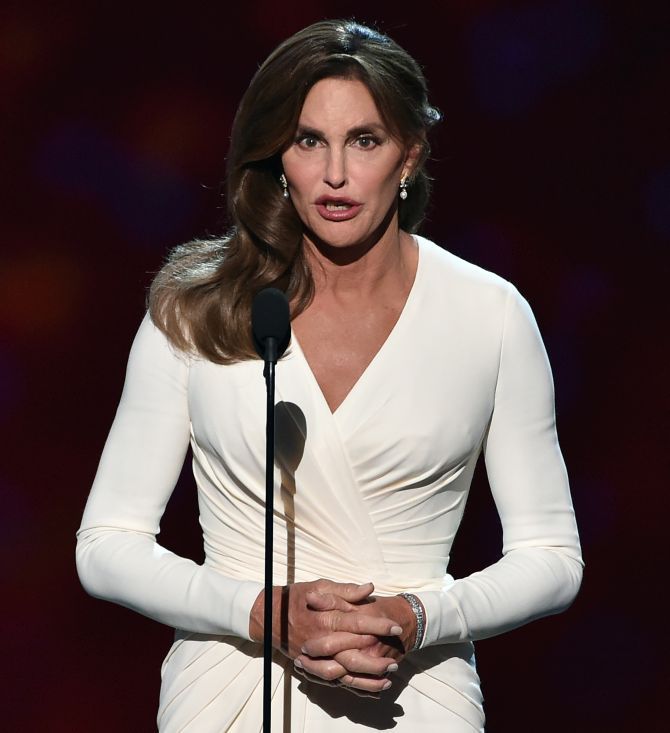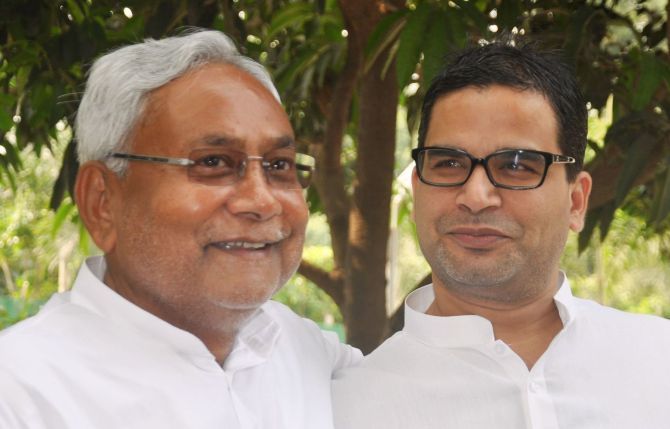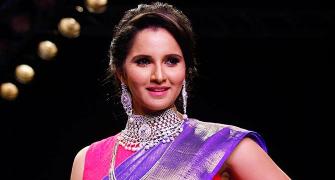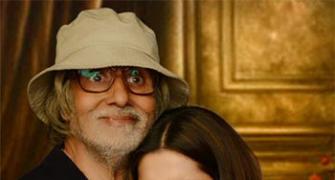The year 2015 witnessed many major events in India. A few people/events were at the forefront, scripting history and dictating opinions.
Take a look and don’t forget to make your pick for the newsmaker of 2015 at the end of the feature.
Cow

When you think of personalities of the year, you wouldn’t normally think of the humble cow, but this year nothing has garnered as much attention as the cow has.
It all started with the Maharashtra government announcing a ban on sale of beef in the state -- a move, which led to massive debates online and offline, spiralling into the ‘beef controversy’.
Furthermore, the lynching in Dadri over the rumours of a man storing beef, made it the top discussion point -- be it inside Parliament, television debates and amongst the aam aadmi.
Hence, for that reason alone, we can’t forget the cow and all the beef that people have had over it!
Arvind Kejriwal

The year 2014 belonged to this ‘aam aadmi’. In February, Arvind Kejriwal redefined the words absolute majority when he stomped to power having won 67 of Delhi’s 70 seats. The victory gave him a second chance at being chief minister. After all, who can forget his 49-day stint as CM the first time around?
And that wasn’t the only highlight of Kejriwal’s year. In December, the Delhi CM took the tough decision to roll out the odd/even car scheme to curb the pollution in Delhi.
Still not convinced he should be newsmaker? What about the time he called Prime Minister Narendra Modi a coward and a psychopath? All hell broke loose in mid-December when he took to Twitter claiming that the CBI at the insistence of the prime minister raided his office, just in order to curb him and control him.
Indrani Mukerjea

There is no such thing as bad publicity. Indrani Mukerjea, the wife of media baron Peter Mukerjea, catapulted to the front pages of newspapers, star of prime time television when she was accused of killing her daughter/sister Sheena Bora.
With twists and turns, which could have been taken out of a Bollywood thriller, the Sheena Bora murder case was the one that gripped the nation and the world over.
Initially, questions of how Sheena was related to Indrani were raised. Were they mother-daughter or were they sisters?
After Indrani was arrested for planning the murder, she was taken to prison and for some time, things went cold.
However, when she was rushed to hospital in October, Indrani became the topic of every conversation again. Did she overdose on pills or was she suffering from a mysterious illness?
One thing’s for sure, the murder surely put her on the nation’s map!
Aamir Khan

This year saw a lot of buzz about the growing ‘intolerance’ among Indians. When Aamir Khan waded into this conversation, all hell broke loose. Protesters were camped outside his Mumbai house. Black ink was smeared on the posters of his films.
On Twitter, people called him a traitor, and his Bollywood colleagues wondered whether he might like to live in a different country.
In November, during the Ramnath Goenka awards ceremony, he courted controversy by saying that his wife, Kiran Rao, was considering whether to move out of the country with their child due to the prevalence of an atmosphere of “intolerance.”
What followed is known to all. In fact, Aamir, who faced a lot of flak, had to release a statement later saying he and his wife did NOT wish to leave India.
However, the perfectionist star mentioned that he stands by what he said and thanked the people who understood him, and stood by him. Phew!
Arun Jaitley

From calling the writers’ rebellion against intolerance a manufactured revolt, to filing a defamation case against the Delhi chief minister, Finance Minister Arun Jaitley has had a busy year.
He started off the year by presenting this year’s Budget in which he gave Prime Minister Narendra Modi’s Make in India a firm push. His budget was well received by India Inc, with most calling it a pro-reform and a positive budget.
In October, however, amidst the raging debate on intolerance, the finance minister chose to air his thoughts by calling the writers and intelligentsia’s revolt a manufactured revolt and said there was no intolerance in the country.
And that wasn’t the end of Jaitley’s year. In December, the finance minister sued Delhi Chief Minister Arvind Kejriwal for defamation for accusing him of corruption in Delhi's cricket body, which he headed for 13 years till 2013. Jaitley filed a civil suit demanding Rs 10 crore in damage.
Sushma Swaraj

The Narendra Modi cabinet has been a busy one. Apart from being embroiled in one of the biggest controversies of the year -- Lalitgate -- the external affairs minister had a lot on her plate, what with her dealings with Pakistan to ensuring the rescue of Indians from Islamic State-invaded Iraq and the Yemen crisis.
She set an example on how to use social media to sort out overseas citizens’ problems. From rescuing women trapped in the UAE and South Africa based on just a Twitter tip from relatives to handling the Yemem crisis, with her active response on social media, she won many hearts.
During the Monsoon session of Parliament, when the Congress stalled proceedings, demanding her resignation on allegations of helping scam tainted former IPL chief Lalit Modi obtain his travel papers, not only did she not resign, she turned the tables on the Congress, reminding Rahul Gandhi of all the scams related to his father Rajiv Gandhi’s tenure. That’s what you call a perfect turnaround, don’t you think so?
She also earned kudos for lending a personal touch to Indo-Pak relations with her successful tour. From speaking in Urdu to Pakistani journalists to meeting three generations of Pakistani Prime Minister Nawaz Sharif’s family, she displayed how important soft skills are in the world of diplomacy and foreign affairs.
Back home, she silenced all criticism for wearing a green saree and speaking in Urdu on the other side of the border. She argued on the floor of the Lok Sabha: “So what if I spoke in Urdu in Pakistan. Isn't Urdu an Indian language also?”
Donald Trump

When he first took that escalator ride down to the stage to announce his candidacy for US President in June, real estate mogul Donald Trump was dismissed as an election sideshow -- a joke candidate that would entertain for a few weeks and then flame out.
Yet, in the six months that followed, the billionaire has only seen his popularity go up.
He’s called for a wall to keep the Mexicans out, demanded the mass deportation of illegal immigrants and now, to cries of outrage from around the world, has insisted that all Muslims be barred from entering the United States.
The Trump’s rhetoric launched a thousand headlines, caused gallons of ink to be spilled making him loom large over 2015 like no other individual.
Well, he can’t be ‘FIRED’ from the race of the newsmakers of 2015.
Islamic State

In 2015, the first thing that struck us was the negative buzz around religion, especially surrounding the Islamic State. From the blood spilled in the streets of Paris to the San Bernardino shootings, the world this year showed its vulnerability to the brand of terror perpetrated by Islamic State.
Over the past 12 months, the group that took root in Iraq and in the chaos of the Syrian war has turned its focus from territorial gains to hitting at “distant enemies”.
And even though the Islamic State has lost significant areas of territory and it’s clear that overall, the Global Coalition is pushing back, more and more people from United Kingdom and Europe are leaving home to join the group, which shows that they are winning the battle of ideas.
Besides the attacks, the militant group has been releasing videos of beheadings, crucifixions and mass shootings to terrorise their enemies.
Today, the Islamic State is considered the ‘MOST DANGEROUS’ militant group in the world.
Caitlyn Jenner

He was once an Olympic medallist and popular step-dad to the senior Kardashian siblings -- Kim, Khloe and Kourtney -- and dad to Kendall and Kylie. But, Bruce Jenner turned the world upside down when in April, he came out to the world as Caitlyn Jenner.
Yes, this guy who many had seen on television as a man’s man became the world’s most famous transgender when she appeared as Caitlyn on the cover of Vanity Fair.
Her transformation, which reportedly included at least 10 hours of facial and breast enhancement surgeries, sparked a global conversation on gender identity -- and her actions were praised with several prestigious awards, including an ESPY.
Bruce’s transition to Caitlyn has been so epic that even Time magazine had her on their shortlist for the ‘Person of the year’ award.
Time said, “Roughly 17 million people watched Jenner explain that she identifies as a woman in an April interview with Diane Sawyer. Vanity Fair’s website shattered traffic records when a corseted Caitlyn was introduced on the magazine’s cover in June. The same day, Jenner joined Twitter and had a million followers in four hours -- less time than it took US President Barack Obama to reach that mark.”
Aylan Kurdi

More than 3,500 asylum seekers have died trying to cross the Mediterranean this year.
But the world really knows just one of their names. Three-year-old Alan Kurdi drowned off the Turkish resort town of Bodrum at the beginning of September. His brother Galib, 5, and their mother, Rehana, 35, perished that night as well, when waves swamped their overcrowded inflatable boat.
However, that single image of the toddler in the red T-shirt and blue shorts lying face down in the sand, the dawn surf lapping gently at his dark hair shook the world and became the face of a wrenching global refugee crisis.
Across the world, no other story but those of Syrian refugees has been covered so extensively. The Syrian civil war has displaced over 12 million people. That’s 12 million people now looking to set up home -- in Germany, Austria, Hungary and across Europe, which then sparked the migrant crisis.
Hardik Patel

In August, the 22-year-old Hardik Patel took the nation by storm when he became the face of the Patidar agitation for OBC reservation in Gujarat. Patel’s claim to fame came when he and his followers orchestrated a rally in Surat in July, which saw a massive turnout and arousing display of rhetoric from Hardik.
His romance with the headlines continued throughout the second half of the year. The agitation was initially non-violent before escalating to result in clashes and the death of 11 individuals.
Presently, the Patel leader is in jail after he was charged for sedition.
Vladimir Putin

What a difference a war makes. In 2014, Russian President Vladimir Putin was a pariah following his armed intervention in Ukraine and illegal annexation of Crimea.
However, come 2015 and everything changed. Under merciless attack from the Islamic State, flailing on the refugee crisis, and consequently desperate to end the war in Syria, European leaders, backed by Obama, have come to an uncomfortable but, in historical terms, not wholly novel conclusion: they need Russia.
In October, he launched air strikes against the Islamic State to punish those guilty of blowing up a Russian airliner over Egypt in October, an incident in which 224 people were killed.
Putin’s domestic position is also far from threat. His popularity ratings have never sunk much below 60 per cent, figures Western leaders can only dream of.
Sundar Pichai

For a man with origins in a south-east Indian family with no car, television or -- until he was 12 -- telephone, Sundar Pichai’s rise to the heights of global technology is striking.
In August 2015, Pichai took over at the helm of Google as a successor to co-founder Larry Page. The gigantic move recognised Pichai’s outstanding talent and track record in 11 years at Google.
With his elevation, he joined the elite club of Indians at the helm of global IT companies such as Microsoft’s Satya Nadella.
Prashant Kishore

Who would have thought? The man who helped steer Narendra Modi to winning the national elections back in 2014 would again work his magic, but this time against Modi and help Nitish Kumar reclaim power in Bihar.
Prashant Kishore, who was credited with making Narendra Modi a political brand in 2014, worked his magic again in 2015 and helped craft Nitish Kumar’s campaign strategy in Bihar that saw him thump his arch foe in the state assembly election.
A native of Bihar, who quit his UN health experts job in Africa in 2011, Kishore put the spotlight on the role of poll managers in India.
Kishore was successful in achieving a very difficult task of demolishing the ‘Brand Modi’ in Bihar which he himself had helped create at the national-level.
And for that very reason, we can’t ignore him and have added him to our list.
Mufti Mohammad Sayeed

On March 1 2015, when Mufti Mohammed Sayeed was sworn in as the chief minister of Jammu-Kashmir, many considered it a turning point in the politics of the state.
It was a historical moment for Kashmir when the People’s Democratic Party came into an alliance with the Bharatiya Janata Party.
Both the sides were as, Muftisaab said to the television cameras after meeting Prime Minister Narendra Modi, different as the ‘South and North Poles.’ Still, the alliance of the opposite poles was woven carefully and craftily.
Further, it is well-known that the BJP-RSS want Article 370 -- which grants special status to Jammu and Kashmir in the Constitution -- to be abrogated a stance which is not held by the PDP.
For this and their differing views on the Armed Forces Special Powers Act, the PDP strongman finds a mention in our list.
Now, its your choice. Go ahead and decide who was 2015's newsmaker for you!










